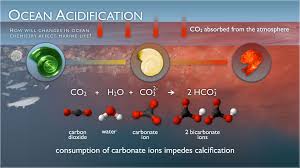Changes to the Earth’s oceans, caused by extreme volcanic activity, triggered the greatest extinction of all time, a study suggests.
The event, which took place 252 million years ago, wiped out more than 90 per cent of marine species and more than two-thirds of the animals living on land.
It happened when Earth’s oceans absorbed huge amounts of carbon dioxide from volcanic eruptions, researchers say.
This changed the chemical composition of the oceans — making them more acidic — with catastrophic consequences for life on Earth, the team says.
The study, co-ordinated by the University of Edinburgh, is the first to show that highly acidic oceans were to blame.
The findings are helping scientists understand the threat posed to marine life by modern-day ocean acidification. The amount of carbon added to the atmosphere that triggered the mass extinction was probably greater than today’s fossil fuel reserves, the team says.
However, the carbon was released at a rate similar to modern emissions. This fast rate of release was a critical factor driving ocean acidification, researchers say.
The Permian-Triassic Boundary extinction took place over a 60,000 year period, researchers say. Acidification of the oceans lasted for around 10,000 years.

